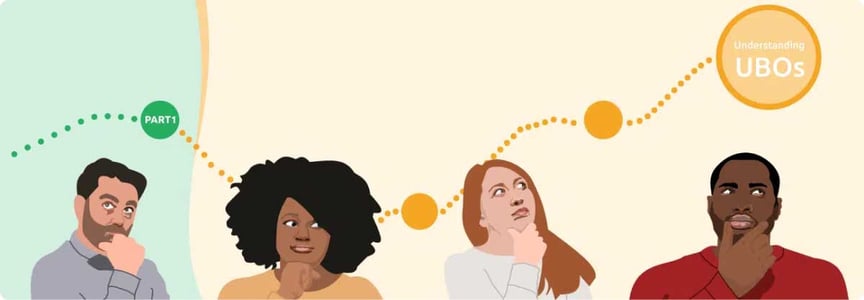Not sure about the what, why and how of identifying Ultimate Beneficial Owners (UBO’s)? In this three-part series, we will dig a little deeper into questions like, what are UBO’s and why they matter, what are the challenges faced when trying to identify UBO’s and we will conclude our series with a look into how Accountable Institutions can identify and manage UBO’s.
 What are Ultimate Beneficial Owners (UBO’s) and why do they matter?
What are Ultimate Beneficial Owners (UBO’s) and why do they matter?
Those with less honourable intentions may look for opportunities to retain control over criminally derived assets by inhibiting the ability of law enforcement to trace the origin and ownership of assets. Companies, trusts or other similar legal arrangements are seen by criminals as potentially useful vehicles to achieve this outcome.
The only way for businesses to prevent these criminals from using complex structures or legal persons to conceal true ownership is by assessing their clients and truly understanding who profits from and operates the business. This is where the concept of identifying UBO’s comes into play.
The Financial Action Task Force (FAFT) defines a UBO as the natural person who ultimately owns or controls a customer and/or the natural person on whose behalf a transaction is being conducted. It also includes those persons who exercise ultimate effective control over a legal person or arrangement.
Typically a UBO is the majority shareholder or a person who holds at least 25% shares in the company but not all entities have a majority shareholding or even shareholders at all. For example, if we look at a listed company that has thousands of shareholders with no clear majority holder, you might look to the CEO, CFO or COO as having ultimate control. For a residential estate management company, club or association you might look to the elected Chairperson. For a Trust, you would first look to the Donor to understand who and where the assets come from, followed by the Trustees to understand who can control the assets and lastly the Beneficiaries to understand who can benefit from the assets.
Although the requirements around establishing beneficial ownership are widely acknowledged, international scandals such as the Panama Papers, Pandora Papers, and more local events such as the Digital Vibes tender corruption scandal, emphasises the need for rigorous customer due diligence (CDD) as well as an accelerated regulatory drive for enhanced ownership disclosure and transparency.
To mitigate your risk of unknowingly becoming engaged with an entity that has something to hide, beneficial ownership identification and verification have become essential components of the Know Your Client (KYC) process. However, navigating complex legal structures that are deliberately designed to conceal UBO’s can sometimes prove to be a challenge.
Click here to continue reading more about these challenges.